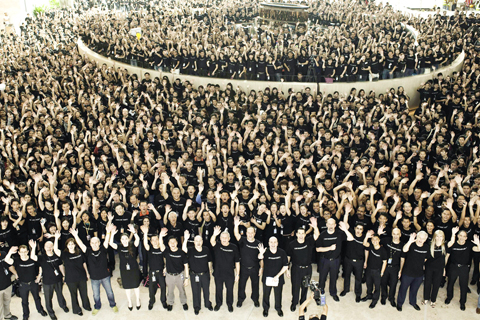Singapore threw open the doors of its second casino yesterday, giving a fresh boost to the city’s tourism sector and raising its profile as a playground for the world’s high-rollers.
The US$5.5 billion Marina Bay Sands, built by US gaming giant Las Vegas Sands, opened at the locally auspicious time of 3:18pm. The number eight sounds like the word for prosperity in Chinese.
It is Las Vegas Sands’ latest big-time bet on the future of Asia’s gaming industry and is its first casino in Asia outside Macau.

PHOTO: AFP
Las Vegas Sands chairman Sheldon Adelson said he expected to recoup his Singapore investment in five years.
“Most of the high-end players are reputable businesspeople. They have to travel anyway so they typically would travel to the major cities, like Hong Kong and Singapore, wherein they do business,” he told reporters.
Singapore gave the green light for casino gambling in 2005, setting off a flurry of construction that went ahead despite the city-state slipping into recession in 2008 because of the global financial crisis.
Its first casino, the US$4.4 billion Resorts World Sentosa built by Malaysia’s Genting Group, opened for business on Feb. 14.
Marina Bay Sands was originally set to open at the end of last year, but faced repeated delays caused by a number of factors, including material and labor shortages and financial problems because of the downturn.
The opening includes the casino and 963 out of 2,560 hotel rooms, a portion of the shopping mall, some restaurants, an exhibition center and the events plaza.
The remaining hotel rooms and suites, a skypark and more shops will open on June 23, while a museum, theaters and other stores will start operations later in the year, the management said.
Officials hope the casinos will help Singapore achieve a target of attracting 17 million visitors a year generating over US$21 billion by 2015, supporting the services sector and reducing the role of manufacturing in the economy.
“This second casino is another boost to the economy, which has been doing much better,” economist David Cohen at research house Action Economics said.
“It should support tourist arrivals, and the retail sector should benefit from that especially now in the midst of the improving global outlook,” he said.
Singapore’s economy surged 13.1 percent in the first quarter from a year ago, prompting the government to sharply upgrade its growth projection this year to 7 percent to 9 percent from 4.5 percent to 6.5 percent.

FREEDOM OF NAVIGATION: The UK would continue to reinforce ties with Taiwan ‘in a wide range of areas’ as a part of a ‘strong unofficial relationship,’ a paper said The UK plans to conduct more freedom of navigation operations in the Taiwan Strait and the South China Sea, British Secretary of State for Foreign, Commonwealth and Development Affairs David Lammy told the British House of Commons on Tuesday. British Member of Parliament Desmond Swayne said that the Royal Navy’s HMS Spey had passed through the Taiwan Strait “in pursuit of vital international freedom of navigation in the South China Sea.” Swayne asked Lammy whether he agreed that it was “proper and lawful” to do so, and if the UK would continue to carry out similar operations. Lammy replied “yes” to both questions. The

Two US House of Representatives committees yesterday condemned China’s attempt to orchestrate a crash involving Vice President Hsiao Bi-khim’s (蕭美琴) car when she visited the Czech Republic last year as vice president-elect. Czech local media in March last year reported that a Chinese diplomat had run a red light while following Hsiao’s car from the airport, and Czech intelligence last week told local media that Chinese diplomats and agents had also planned to stage a demonstrative car collision. Hsiao on Saturday shared a Reuters news report on the incident through her account on social media platform X and wrote: “I

SHIFT PRIORITIES: The US should first help Taiwan respond to actions China is already taking, instead of focusing too heavily on deterring a large-scale invasion, an expert said US Air Force leaders on Thursday voiced concerns about the Chinese People’s Liberation Army’s (PLA) missile capabilities and its development of a “kill web,” and said that the US Department of Defense’s budget request for next year prioritizes bolstering defenses in the Indo-Pacific region due to the increasing threat posed by China. US experts said that a full-scale Chinese invasion of Taiwan is risky and unlikely, with Beijing more likely to pursue coercive tactics such as political warfare or blockades to achieve its goals. Senior air force and US Space Force leaders, including US Secretary of the Air Force Troy Meink and

‘BUILDING PARTNERSHIPS’: The US military’s aim is to continue to make any potential Chinese invasion more difficult than it already is, US General Ronald Clark said The likelihood of China invading Taiwan without contest is “very, very small” because the Taiwan Strait is under constant surveillance by multiple countries, a US general has said. General Ronald Clark, commanding officer of US Army Pacific (USARPAC), the US Army’s largest service component command, made the remarks during a dialogue hosted on Friday by Washington-based think tank the Center for Strategic and International Studies. Asked by the event host what the Chinese military has learned from its US counterpart over the years, Clark said that the first lesson is that the skill and will of US service members are “unmatched.” The second